北京市西城区重点中学2015年7月新初三暑假作业 2016届初三英语综合训练卷 3 含答案
北京市西城区2016届九年级中考二模英语试题解析(解析版)
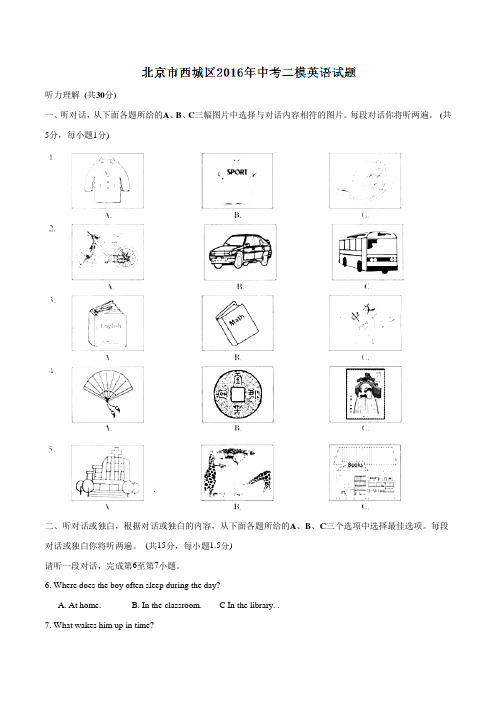
听力理解(共30分)一、听对话,从下面各题所给的A、B、C三幅图片中选择与对话内容相符的图片。
每段对话你将听两遍。
(共5分,每小题1分)二、听对话或独白,根据对话或独白的内容,从下面各题所给的A、B、C三个选项中选择最佳选项。
每段对话或独白你将听两遍。
(共15分,每小题1.5分)请听一段对话,完成第6至第7小题。
6. Where does the boy often sleep during the day?A. At home.B. In the classroom. C In the library. .7. What wakes him up in time?A. An alarm clock.B. Much noise.C. The bell. 请听一段对话,完成第8至第9小题。
8. What are the speakers talking about?A. Their teacher.B. Their study.C. Their future.9. Who wants to learn medicine in college?A. The boy.B. The girl.C. Both of them.请听一段对话,完成第10至第11小题。
10. What is the boy doing now?A. Preparing for his biology exam.B. Watching a basketball game.C. Doing his work at the library.11. Why does the girl write the report on the paper?A. Her computer doesn’t work.B. She likes writing very much.C. The teacher asks her to do that.请听一段独白,完成第12至第13小题。
西城区九年级英语综合练习一
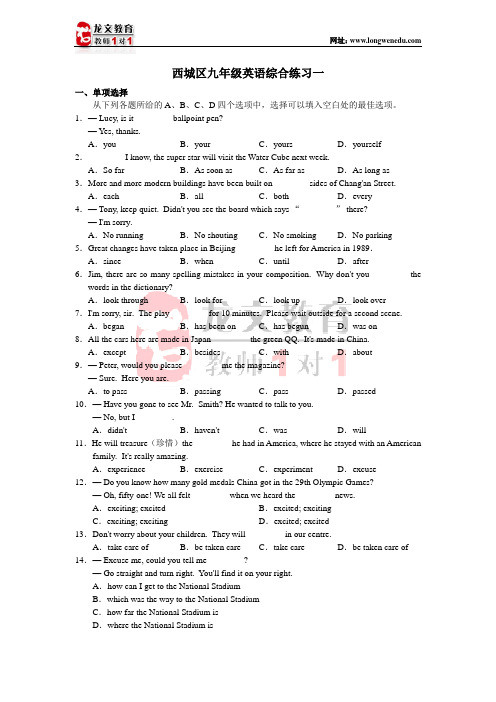
西城区九年级英语综合练习一一、单项选择从下列各题所给的A、B、C、D四个选项中,选择可以填入空白处的最佳选项。
1.— Lucy, is it ________ ballpoint pen?— Yes, thanks.A.you B.your C.yours D.yourself2.________ I know, the super star will visit the Water Cube next week.A.So far B.As soon as C.As far as D.As long as 3.More and more modern buildings have been built on ________sides of Chang'an Street.A.each B.all C.both D.every4.— Tony, keep quiet. Didn't you see the board which says “________” there?— I'm sorry.A.No running B.No shouting C.No smoking D.No parking 5.Great changes have taken place in Beijing ________ he left for America in 1989.A.since B.when C.until D.after6.Jim, there are so many spelling mistakes in your composition. Why don't you ________ the words in the dictionary?A.look through B.look for C.look up D.look over7.I'm sorry, sir. The play ________ for 10 minutes. Please wait outside for a second scene.A.began B.has been on C.has begun D.was on8.All the cars here are made in Japan ________ the green QQ. It's made in China.A.except B.besides C.with D.about9.— Peter, would you please ________ me the magazine?— Sure. Here you are.A.to pass B.passing C.pass D.passed10.— Have you gone to see Mr. Smith? He wanted to talk to you.— No, but I ________.A.didn't B.haven't C.was D.will11.He will treasure(珍惜)the ________ he had in America, where he stayed with an American family. It's really amazing.A.experience B.exercise C.experiment D.excuse12.— Do you know how many gold medals China got in the 29th Olympic Games?— Oh, fifty-one! We all felt ________ when we heard the ________ news.A.exciting; excited B.excited; excitingC.exciting; exciting D.excited; excited13.Don't worry about your children. They will ________ in our centre.A.take care of B.be taken care C.take care D.be taken care of 14.— Excuse me, could you tell me ________?— Go straight and turn right. You'll find it on your right.A.how can I get to the National StadiumB.which was the way to the National StadiumC.how far the National Stadium isD.where the National Stadium is15.Two thousand dollars ________ too much for the course. Can we make it cheaper?A.are B.is C.was D.were16.He is the old man ________ spoke at the meeting just now.A.which B.whose C.what D.who17.The sign ________ always makes me think of the great time I spent in Beijing in 2008.18.— Would you like to enter the photo competition?— ________, but I lost my father's new digital camera last month.A.I'd love to B.That's all right C.I'm sorry D.Come on二、完形填空阅读短文,掌握其大意,然后从短文后各题所给的四个选项中选择最佳选项。
北京市海淀区重点中学2015年7月新初三暑假备战2016年中考单项选择题 共5组 含答案
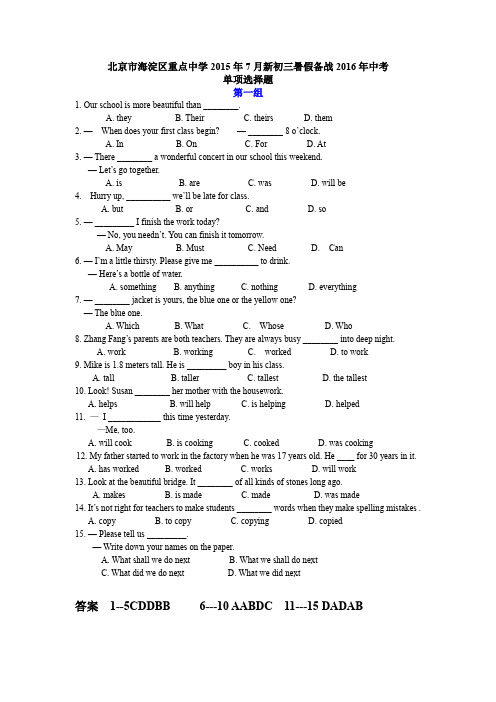
北京市海淀区重点中学2015年7月新初三暑假备战2016年中考单项选择题第一组1. Our school is more beautiful than ________.A. theyB. TheirC. theirsD. them2. —When does your first class begin? — ________ 8 o’clock.A. InB. OnC. ForD. At3. — There ________ a wonderful concert in our school this weekend.— Let’s go together.A. isB. areC. wasD. will be4. Hurry up, __________ we’ll be late for class.A. butB. orC. andD. so5. — _________ I finish the work today?— No, you needn’t. You can finish it tomorrow.A. MayB. MustC. NeedD. Can6. — I’m a little thirsty. Please give me __________ to drink.— Here’s a bottle of water.A. somethingB. anythingC. nothingD. everything7. — ________ jacket is yours, the blue one or the yellow one?— The blue one.A. WhichB. WhatC. WhoseD. Who8. Zhang Fang’s parents are both teachers. They are always busy ________ into deep night.A. workB. workingC. workedD. to work9. Mike is 1.8 meters tall. He is _________ boy in his class.A. tallB. tallerC. tallestD. the tallest10. Look! Susan ________ her mother with the housework.A. helpsB. will helpC. is helpingD. helped11. —I ____________ this time yesterday.—Me, too.A. will cookB. is cookingC. cookedD. was cooking12. My father started to work in the factory when he was 17 years old. He ____ for 30 years in it.A. has workedB. workedC. worksD. will work13. Look at the beautiful bridge. It ________ of all kinds of stones long ago.A. makesB. is madeC. madeD. was made14. It’s not right for teachers to make students ________ words when they make spelling mistakes .A. copyB. to copyC. copyingD. copied15. — Please tell us _________.— Write down your names on the paper.A. What shall we do nextB. What we shall do nextC. What did we do nextD. What we did next答案1--5CDDBB 6---10 AABDC 11---15 DADAB北京市海淀区重点中学2015年7月新初三暑假备战2016年中考单项选择题第二组1. —Hi, Jim. Can you lend ______ your ruler?—Sorry, I’m using it.A. myB. IC. meD. mine2. —Do you agree______ her, Mike?—Of course.A. toB. inC. atD. with3. — I called you last night, but_______ answered the phone. — Sorry, I was out last night.A. somebodyB. nobodyC. anybodyD. everybody4. —Did you buy the skirt yesterday? —No. It’s very expensive, _____ I didn’t buy it.A. butB. orC. soD. since5. The doctor looked over the boy carefully after he_____ to the hospital.A. takesB. is takenC. tookD. was taken6. —_____ did you have the party last Wednesday?—In Frank’s house.A. WhenB. WhereC. WhatD. Why7. Why not go to the zoo with me? I’m sure you ______a good time there.A. have hadB. hadC. will haveD. have8. —What’s on the plate?—There ______some bread on it.A. isB. areC. hasD. be9. Don’t be late again. You_____ be here on time.A. mayB. needC. mustD. can10. He will go to the Great Wall if it ______ next Friday.A. didn’t rainB. doesn’t rainC. won’t rainD. isn’t raining11. —Is Tom ____ student in your class? —Sure.A. strongB. strongerC. the strongestD. strongest12. —Are you free now? —No. I have a lot of things_______ .A. doB. didC. doingD. to do13. Mr. Green ______in Guangzhou for about 7 years. He has lots of Chinese friends now.A. has livedB. is livingC. livedD. lives14. —Do you know ___________?—Next month.A. when will they comeB. when did they comeC. when they cameD. when they will come15. —Could you help me carry the heavy box, young man?—.A. My favoriteB. With pleasureC. You are rightD. Don’t worry答案1-5 CDBCD 6-10 BCACB 11-15 CDADB北京市海淀区重点中学2015年7月新初三暑假备战2016年中考单项选择题第三组1.It isn’t cell phone. I left it at home.A. mineB. meC. ID. my2.—When did Hong Kong return to our motherland.'? —1997.A. OnB. InC. AtD. For3.—is your new teacher? —The one standing with a dictionary in his hand.A. WhoB. WhatC. WhereD. Which4. —Listen, what’s the noise?—My father the programme of the World Cup.A. watchesB. has watchedC. is watchingD. will watch5. Li Ming has the key to our class, and he often comes to school .A. earlyB. earliestC. much earlierD. earlier6.—Lucy, what about going camping if it tomorrow?—Sounds great!A. didn’t rainB. hasn’t rain edC. won’t rainD. doesn’t rain7.—What was the weather like in Guangxi Province this spring?—There very little rain.A. hasB. haveC. isD. was8.—It’s very important to save water.—I agree with you. I hope ________ can realize that.A. somebodyB. nobodyC. everybodyD. anybody9. The teachers ask us not _________ in class.A. to sleepB. sleepC. sleepingD. sleeps10.—How long Mr. Li you English, Daming?—For three years.A. does; teachB. did; teachC. has; taughtD. are; teaching11. The students _________ their homework when the teacher came into the classroom.A. doB. will doC. didD. were doing12.The players kept on training it rained heavily.A. sinceB. thoughC. becauseD. for13. —May I copy your homework? —Sorry, you .A. may notB. needn’tC. mustn’tD. won’t14.The workers are building a school. I hope it before August this year.A. finishesB. will finishC. is finishedD. will be finished15. — Do you know ? I’m going to see him.— Sorry, I don’t know.A. where he livesB. where does he liveC. where did he liveD. where he lived答案1-5 DBACB 6-10 DDCAC 11-15 DBCDA单项选择题第四组1. My mother is a manager, and __________ works in Lenovo in Zhongguancun.A. sheB. heC. herD. him2. – Where is the library? – It’s __________ the 2nd floor.A. atB. forC. onD. in3. – Must I stay here with you?– No, you __________. Just do your own business.A. mustn’tB. needn’tC. can’tD. may not4. – __________ do you want to be when you grow up?– A teacher. Because I love children very much.A. WhatB. WhyC. HowD. When5. – Daming is going to have a good rest when he___________ the exam.– So is Lingling.A. will finishB. finishesC. finishedD. is finishing6. – What were you doing at eight yesterday morning? – I ______ mom with the housework.A. helpedB. will helpC. am helpingD. was helping7. I’m not only growing older and taller, but also __________than before.A. cleverB. clevererC. cleverestD. the cleverest8. – Tom, you look sad today. – Yeah, I have made __________ mistakes in the exam.A. fewB. a fewC. littleD. a little9. – Is your father at home? – No. He __________ to Shanghai on business.A. goesB. wentC. has beenD. has gone10. – John, why do you come to Beijing? – I come here __________ a good job.A. looking forB. look forC. to look forD. looked for11. – Mom, you are a wonderful cook. The food tastes really __________.– You have a sweet voice, dear.A. goodB. wellC. badD. badly12. Excuse me, could you tell me __________?A. how I can get to Beijing ZooB. how can I get to Beijing ZooC. where is Beijing ZooD. where Beijing Zoo was13. – Mrs. Zhang, your daughter is excellent. She is beautiful both inside and outside.– __________.A. Not at allB. All rightC. Thank youD. You’re welcome14. The whole China __________ to tears by Cairen Danzhou (才仁旦舟), the youngest volunteerand hero in Yushu, Qinghai Province.A. moveB. movesC. is movingD. is moved15. – Dad, I’m afraid that I can’t do it.– Take it easy, dear. You’ll never know it __________ you try.A. afterB. sinceC. whenD. until答案 1 — 5 ACBAB 6 — 10 DBBDC 11 — 15 AACDD单项选择题第五组1. Zhang Yining is ______ favorite table tennis player.A. IB. meC. myD. mine2. — ______ did you go to the park yesterday? — I went there by bus.A. WhatB. HowC. WhyD. Who3. — When will Mr Black come to Beijing? — ______ September 5.A. InB. AtC. OfD. On4. Little Helen is very young, ______ she knows a lot of things.A. becauseB. orC. butD. so5. — Shall we leave now? —Don’t worry. We still have ______ time left.A. littleB. fewC. a fewD. a little6. — Can you stay here for the party? — Sorry, I ______. I have to go to a meeting.A. can’tB. mustn’tC. needn’tD. shouldn’t7. — Who sings ______, Lily or Jane? — Jane, of course.A. wellB. betterC. bestD. the best8. — Alice, turn down the TV, please. I ______ on the phone now. — Oh, sorry.A. talkB. talkedC. am talkingD. will talk9. I got up early this morning ______ the first bus.A. to catchB. catchingC. catchD. caught10. The price of this computer is ______ of the three.A. highB. higherC. highestD. the highest11. Mother ______ me a nice present on my next birthday.A. givesB. gaveC. will giveD. has given12. — Can I help you? — Yes. I ______ this watch here yesterday, but it doesn’t work.A. buyB. boughtC. will buyD. have bought13. —Did you go to Jim’s birthday party yesterday? — No, I ______.A. haven’t invitedB. am not invitedC. didn’t inviteD. wasn’t invited14. I will call you if I ______ the ticket to the football match.A. getB. gotC. will getD. have got15. — Could you tell me ______ John?— At 10:00 tomorrow morning.A. when will you meetB. when did you meetC. when you metD. when you will meet答案1- 5 CBDCD 6-10 ABCAD 11-15 CBDAD。
北京市西城区2016届九年级下学期第一次模拟考试英语试题(解析版)
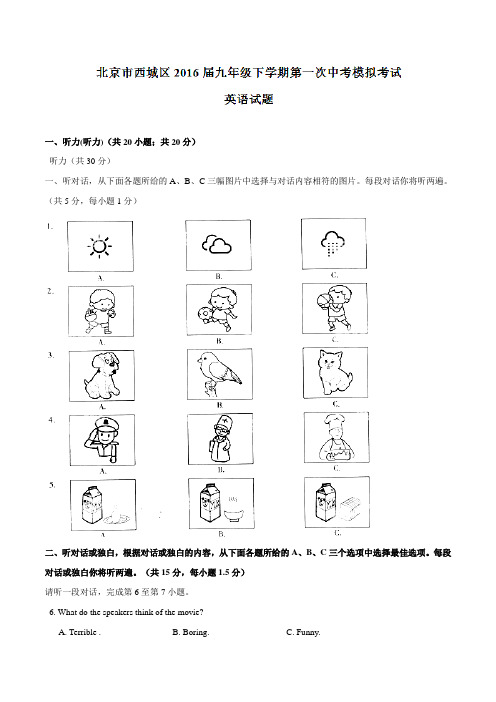
一、听力(听力)(共20小题;共20分)听力(共30分)一、听对话,从下面各题所给的A、B、C三幅图片中选择与对话内容相符的图片。
每段对话你将听两遍。
(共5分,每小题1分)二、听对话或独白,根据对话或独白的内容,从下面各题所给的A、B、C三个选项中选择最佳选项。
每段对话或独白你将听两遍。
(共15分,每小题1.5分)请听一段对话,完成第6至第7小题。
6. What do the speakers think of the movie?A. Terrible .B. Boring.C. Funny.7. What are they going to do?A. To watch the moive againB. To go to the zooC. To buy the movie 请听一段对话,完成第8至第9小题。
8. What did the girl buy?A. A dogB. A walletC. A picture9. How much did the girl pay?A. $20.B. $25.C. $40.请听一段对话,完成第10至第11小题。
10. What’s wrong with the man?A. He has a feverB. He has a headacheC. He has a toothache11. What does the woman suggest doing?A. Having a good rest.B. Taking his temperature.C. Taking some medicine.请听一段对话,完成第12至第13小题。
12. Why does the woman want to see Paul?A. He doesn’t do well in his studiesB. He doesn’t practice soccer after classC. He doesn’t want to volunteer at school13. What does Paul decide to do?A. To get up earlyB. To stop watching TVC. To give up his job请听一段独白,完成第14至第15小题。
北京市西城区2015年初三一模英语试卷及答案Word版
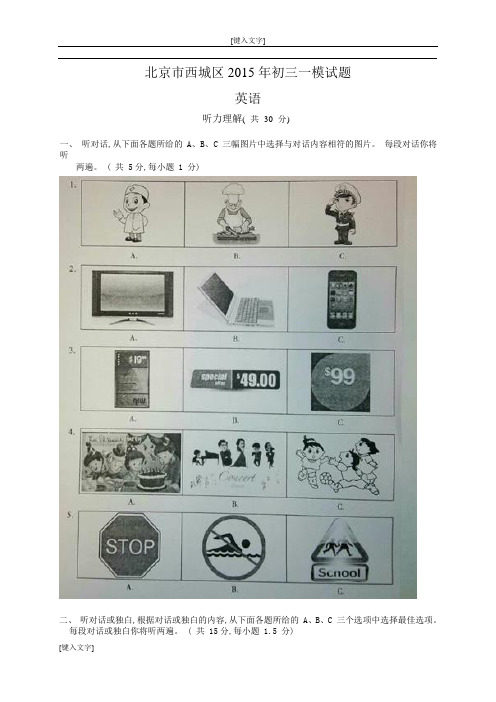
北京市西城区2015年初三一模试题英语听力理解(共30分)一、听对话,从下面各题所给的 A、B、C 三幅图片中选择与对话内容相符的图片。
每段对话你将听两遍。
( 共 5分,每小题 1 分)二、听对话或独白,根据对话或独白的内容,从下面各题所给的 A、B、C 三个选项中选择最佳选项。
每段对话或独白你将听两遍。
( 共 15分,每小题 1.5 分)请听一段对话,完成第 6至第 7小题。
6、What’s the matter with the man?A.He’s got a coldB.He’s lost hix umbrellaC.He’s had an accident7.What was the weather like yesterday afternoon?A.SunnyB.WindyC.Rainy请听一段对话,完成第 8至第 9小题。
8.What’s Helen going to do on Friday evening?A.To visit her neighboursB.To go out with her friendsC.To have a birthday party9.What’s the woman going to take with her?A.A bottle of wineB.Some food and drinksC.Some flowers 请听一段对话,完成第 10至第 11小题。
10.What can we learn about the man?A.He learnt cooking from his motherB.He is taking a cooking lessonC.He works in a restaurant11.What makes the woman get bored now?A.Cooking at homeB.Eating take-out foodC.Being busy with her work请听一段对话,完成第 12至第 13小题。
2016.1 北京西城区初三期末 英语试题及答案
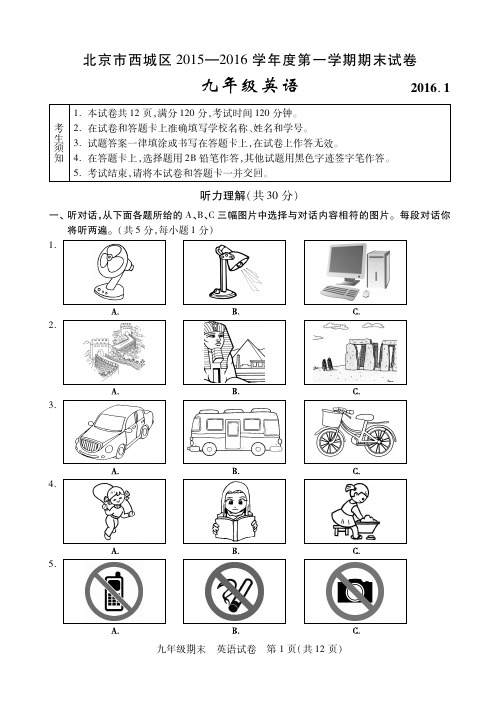
小 题 单 共 "$ 分 每 "分 四 项 填 空 + * , I四 选 从 下 面 各 题 所 给 的 个 选 项 中 择 可 以 填 入 空 白 处 的 最 佳 选 项
#"' V > R 0 5 0 = 2 /0 = 0 P 4 W 3 = @ K ?D 1P 5 71D 2 'K P :8 D D 7> 19O D = + '4 /0 * '/0 = 5 D D ' , '/0 = 4 I '/0 = 4 0 8 O
"%'./3 5 C 3 12 071D 23 6D B5 5 /0: B4 0 B: + 'K 5 C 8 D 4 0 4 3 5 1D D 1D 1S 0 2T 0 3 = P 4 I 3 @ ' * 'K 5 2 3 4 O D B1?0 ? 6@* D 4 5 D 1 /> 4 5 D = @5 0 3 C /0 = 4 ' , ', /> 8 ?= 0 1C 3 15 3 70J3 = 5 > 13 C 5 > N > 5 > 0 4 5 D8 0 3 = 13 = 5 4 ' 听 记 本 共 "$ 分 每 #分 小 题 三 对 话 录 关 键 信 息 段 对 话 你 将 听 两 遍 !请 将 根 据 所 听 到 的 对 话 内 容 和 提 示 词 语 所 缺 的 关 键 信 息 填 写 在 答 题 卡 的 相 应 位 置 上 定 % & ' & ( )*+ , -. 预 /0 /0 & . /0 *+ U 0 D = 9 0!"&! !"-! #(= ?5 D5 /0 #G5 / !"F! 4 > 19 8 0= D D : 4 !"G! O D D ?O D = 5 /00 N 0 1> 19: 0 3 8 3!#$! C 38 8 C D D 7 ?> 110 =
某市重点中学2015年7月新初三暑假作业 2016届初三英语综合训练卷 3 含答案
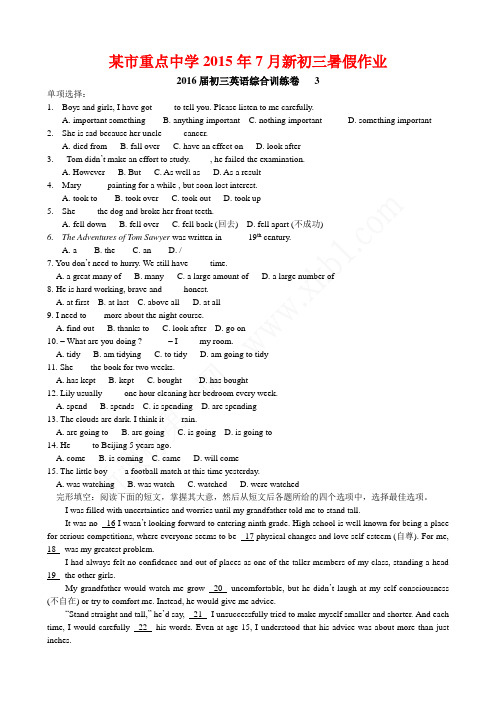
某市重点中学2015年7月新初三暑假作业2016届初三英语综合训练卷 3单项选择:1.Boys and girls, I have got ____ to tell you. Please listen to me carefully.A. important somethingB. anything importantC. nothing importantD. something important2.She is sad because her uncle ____ cancer.A. died fromB. fall overC. have an effect onD. look after3.Tom didn’t make an effort to study. ____, he failed the examination.A. HoweverB. ButC. As well asD. As a result4.Mary _____ painting for a while , but soon lost interest.A. took toB. took overC. took outD. took up5.She ____ the dog and broke her front teeth.A. fell downB. fell overC. fell back (回去)D. fell apart (不成功)6.The Adventures of Tom Sawyer was written in _____ 19th century.A. aB. theC. anD. /7. You don’t need to hurry. We still have ____ time.A. a great many ofB. manyC. a large amount ofD. a large number of8. He is hard working, brave and ____ honest.A. at firstB. at lastC. above allD. at all9. I need to ___ more about the night course.A. find outB. thanks toC. look afterD. go on10. – What are you doing ? – I ____ my room.A. tidyB. am tidyingC. to tidyD. am going to tidy11. She ___ the book for two weeks.A. has keptB. keptC. boughtD. has bought12. Lily usually ____ one hour cleaning her bedroom every week.A. spendB. spendsC. is spendingD. are spending13. The clouds are dark. I think it ___ rain.A. are going toB. are goingC. is goingD. is going to14. He ____ to Beijing 5 years ago.A. comeB. is comingC. cameD. will come15. The little boy ___ a football match at this time yesterday.A. was watchingB. was watchC. watchedD. were watched完形填空:阅读下面的短文,掌握其大意,然后从短文后各题所给的四个选项中,选择最佳选项。
北京市海淀区重点中学2015年7月新初三暑假备战2016年中考阅读理解题 共5组 含答案
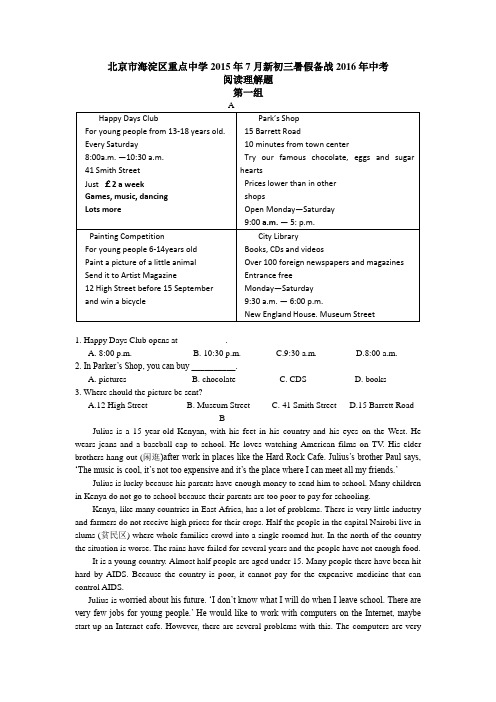
北京市海淀区重点中学2015年7月新初三暑假备战2016年中考阅读理解题第一组AHappy Days ClubFor young people from 13-18 years old. Every Saturday8:00a.m. —10:30 a.m.41 Smith StreetJust £2 a weekGames, music, dancingLots morePark’s Shop15 Barrett Road10 minutes from town centerTry our famous chocolate, eggs and sugar heartsPrices lower than in othershopsOpen Monday—Saturday9:00 a.m.— 5: p.m.Painting CompetitionFor young people 6-14years old Paint a picture of a little animal Send it to Artist Magazine12 High Street before 15 September and win a bicycleCity LibraryBooks, CDs and videosOver 100 foreign newspapers and magazines Entrance freeMonday—Saturday9:30 a.m. — 6:00 p.m.New England House. Museum Street1. Happy Days Club opens at __________ .A. 8:00 p.m.B. 10:30 p.m.C.9:30 a.m.D.8:00 a.m.2. In Parker‟s Shop, you can buy __________.A. picturesB. chocolateC. CDSD. books3. Where should the picture be sent?A.12 High StreetB. Museum StreetC. 41 Smith StreetD.15 Barrett RoadBJulius is a 15 year-old Kenyan, with his feet in his country and his eyes on the West. He wears jeans and a baseball cap to school. He loves watching American films on TV. His elder brothers hang out (闲逛)after work in places like the Hard Rock Cafe. Julius‟s brother Paul says, …The music is cool, it‟s not too expensive and it‟s the place where I can meet all my friends.‟Julius is lucky because his parents have enough money to send him to school. Many children in Kenya do not go to school because their parents are too poor to pay for schooling.Kenya, like many countries in East Africa, has a lot of problems. There is very little industry and farmers do not receive high prices for their crops. Half the people in the capital Nairobi live in slums (贫民区) where whole families crowd into a single-roomed hut. In the north of the country the situation is worse. The rains have failed for several years and the people have not enough food.It is a young country. Almost half people are aged under 15. Many people there have been hit hard by AIDS. Because the country is poor, it cannot pay for the expensive medicine that can control AIDS.Julius is w orried about his future. …I don‟t know what I will do when I leave school. There are very few jobs for young people.‟ He would like to work with computers on the Internet, maybe start up an Internet cafe. However, there are several problems with this. The computers are veryexpensive. Next the electricity supply does not run all day every day. Finally, the telephone connections are not very good, and sometimes Net signals are lost.4. Which of the following is true?A. All children in Kenya go to schoolB. Many children‟s parents are as rich as Julius‟s.C. Schools are free in Kenya.D. Julius‟s parents can pay for his schooling.5. Why have many people got AIDS in Kenya according to the passage?A. Because there is little industry.B. Because whole families live in a small hut.C. Because half people are aged under 15.D. The country is too poor to control the disease.6. How many problems does Julius need to solve if he start up an Internet cafe?A. Two.B. Three.C. One.D. Four.CAutomobiles were originally developed in Europe. Germanengineers Gottlieb Daimler and Karl Benz built the first successfulgasoline engines in 1885. After 1900, however, the United Statesbecame a leader in automobile production.AutomobileThe first cars were handmade and very expensive. Only people in rich cities could afford them. The first company to make gasoline cars in the U.S. was the Duryea Motor Wagon Company. Then, in 1901, Ransom E. Olds Began mass-producing his car, the Oldsmobile. In 1913 Henry Ford made great strides in the mass production of cars by using an assembly line in his factory. Mass production meant that each car was less expensive to make. Now car ownership was affordable for the average person. By 1916 there were more than one million cars in the United States.The automobile gave people the freedom to travel anywhere there were passable roads. Families that lived great distance apart could travel by automobile to visit each other. People could visit places they had never seen before.Before the mass production of cars, people lived close to work. Their means of transportation included walking, riding a bicycle, using a horse and carriage, or taking a train. The automobile gave people the ability to live farther away from work. The result was that gradually people moved out of the cities to the less crowded suburbs.The automobile industry created millions of jobs. The jobs were not just in the auto factories, where the cars were assembled. Workers were needed to make auto parts, run gas stations and repair shops, and work at new motels and restaurants that served people who traveled by car. Jobs became available at car rental companies. People were needed to build roads. These jobs and many others still exist because of the automobile.7. The first gasoline cars that were produced were ________.A. very affordableB. very expensiveC. mass-producedD. bought by many people8. The rise of the automobile industry ___________.A. destroyed many jobsB. made travel more difficultC. created many jobsD. had no effect on suburbs9. Cars that were mass-produced __________.A. made people move to the citiesB. were bought by only a few peopleC. made nature enjoying more difficultD. were possible for more people to afford10. Before the automobile was mass-produced, people traveled in the following ways exceptA. by airplane.B. on foot.C. by horse and carriage.D. by bicycle.DA small city in southwest Britain is banning(禁用) plastic bags to help the environment and cut waste—a step that environmentalists believe is a first for Europe.Shopkeepers in Modbury agreed to stop handing out disposable plastic bags to customers on Saturday. They said paper sacks and cloth carrier bags would be offered instead.Last month, San Francisco became the first U.S. city to ban plastic grocery bags. Internationally, laws to discourage the use of plastic bags have been passed in parts of South Africa and Ireland, where governments either tax (收税)shoppers who use them or fine companies that hand them out. Bangladesh already bans them, and so do at least 30 small Alaskan villages.Modbury, about 225 miles southwest of London, has also declared a bag amnesty(宽限期), allowing local people to hand in plastic bags that are kept at home. They will be sent for traveling.The Modbury ban was the idea of Rebecca Hosking, who saw the effect of bags on sea life while he works in the Pacific as a wildlife camerawoman. She said response(反应) in the town so far had been “really positive”“Modbury is quite an old—fashioned city and a lot of people have wicker baskets to go out shopping anyway,” Hosking told Sky News Television.The Worldwatch Institute, an environmental research agency, states that 100 billion plastic bags are thrown away each year in the United States alone. More than 500 billion are used yearly around the world.11.What does the underlined word “disposable” in the passage mean?A. acceptableB. throw—awayC. long lastingD. valuable12. It can be inferred from the passage that _____________.A. most of the people in Modbury continue to use plastic bagsB. most countries in the world have passed laws to ban plastic bagsC. fewer and fewer plastic bags will be used in the worldD. San Francisco is the first city to ban plastic bags in the world13. Which of the following may be the best title of the text?A. British Cities Banning Plastic BagsB. Some Cities Banning Plastic BagsC. Effect of Plastic Bags on Sea AnimalsD. Environmental Protection答案A DBAB DDBC BCDAD BCB北京市海淀区重点中学2015年7月新初三暑假备战2016年中考阅读理解题第二组AMr. Zhang正在国外旅游, 这是他所入住宾馆的房卡。
某市重点中学2015年7月新初三暑假备战2016年中考完形填空题 共5组 含答案

某市重点中学2015年7月新初三暑假备战2016年中考完形填空题第一组Five years ago, Chet Szuber received the heart of his youngest child, Patti, who had been killed in a car accident. Now, with each passing day, he celebrates her spirit.Szuber had to 36 his job because of his heart disease. In 1990, Szuber was put on the waiting list for a heart transplant (移植), which seemed to offer his last hope to live. But as years went by and no heart came his 37 , he got to a point where he could 38 move around during the day. “I had kind of given up,” he says.Early on Aug. 18, 1994, Patti, then 22, was thrown from the car on the mountain road. 39 the Szubers got to the hospital, she was there with no hope of staying alive. Her family remembered that she had once mentioned that she had filled out an organ-donor card (器官捐赠卡), so they gave the hospital the go-ahead to do whatever was 40 to get her organs to needy recipients (people who receive the organs). On Aug. 21, Szuber was informed that Patti was brain dead and suggested that he could get his daughter’s heart. Szuber 41 , “I wasn’t sure I could stand every heartbeat making me remember Patti.”Finally, his wife asked him to accept. 42 of Patti’s organs were given to other recipients, and within 24 hours her heart was beating in Szuber. Since then he has tried to honor her memory as best he can by speaking for organ donation. Every year he gives a dozen 43 around the country, raising awareness (意识)of the need for organ donors and asking people to sign up.44 most other recipients, Szuber has never celebrated the “second birthday.”“It’s hard to celebrate a life and death 45 ,”says his wife, “so we just kind of forgot about it” . But those who have received Patti’s organs cannot forget. Thanks to Patti’s organs, they now live a normal life, 46 the problems they ever had. It is a feeling Chet Szuber knows well, but always with that heartbreak. “It’s such a bittersweet situation. I certainly 47 the good health,”he says, “but I sure do miss that kid.”36. A. leave B. lose C. take D. change37. A. list B. hope C. way D. chance38. A. hardly B. slowly C. only D. nearly39. A. By the time B. As soon as C. Not until D. Shortly before40. A. useful B. necessary C. hopeful D. possible41. A. answered B. nodded C. worried D. refused42. A. All B. Both C. Some D. Any43. A. cards B. lessons C. speeches D. programs44. A. For B. Unlike C. With D. Besides45. A. in this way B. as usual C. now and then D. at the same time46. A. tired of B. free of C. afraid of D. careful of47. A. require B. enjoy C. treasure D. appreciate36 — 39 ACAA 40 — 43 BDCC 44—47 BDBD某市重点中学2015年7月新初三暑假备战2016年中考完形填空题第二组Sarah like to dive for treasure (潜水寻宝). She and Matthew dived together many times. There was only one 36 . The waters in which they dived were full of sharks. So one of them was watching for sharks while 37 dived.One day Matthew was exploring the bottom. Sarah 38 on top with another diver namedDavid. 39 she saw a huge shadow(影子)in the water. It was a shark, and it was heading straight for David!What should she do? She was afraid to shout a warning to David. It might 40 him, andhe might start splashing. Sarah knew the shark would be attracted by splashing.There was only one thing to do. She must tell David about the shark in a 41 way. Then, perhaps, he could swim away 42 . The shadow was huger now. S arah’s 43 was in her mouth, but she swam over to David. In a quiet voice she told him, “There is a shark behind you. Don’t splash. Swim to the boat—fast!”David 44 . He turned pale, but he did not splash. They headed for the boat.Sarah looked quickly over her shoulder. The shark was right behind them. They reached the boat just in time. She and David 45 themselves up. The jaws of the shark snapped shut, but it was 46 late. They were safe.Later Matthew and David 47 Sarah. “ You are a brave young woman,” they told her.“Treasure hunting is fun,” said Sarah. “You just have to remember one thing. Sharks like to go hunting, too!”36. A. problem B. thing C. boat D. water37. A. the other B. another C. some D. others38. A. walked B. ran C. swam D. went39.A. Surprisingly B. Suddenly C. Quickly D. Normally40. A. force B. interest C. warn D. frighten41. A. quick B. special C. quiet D. good42. A. dangerously B. safely C. fast D. slowly43. A. stomach B. finger C. heart D. tooth44. A. nodded B. disagreed C. answered D. knew45. A. put B. brought C. speeded D. pulled46. A. so B. too C. very D. quite47 A. honor B. praise C. admire D.know36---41 AACBDC 42---47 BCADBB某市重点中学2015年7月新初三暑假备战2016年中考完形填空题第三组It was a cold dark winter’s n ight. It was getting late and I was tired so I went to bed.At about two in the morning my phone began to ring. It was from mum. I started to panic and my heart was racing because mum has had her voice box removed because she had cancer(癌症), and she only 36 if anything is wrong. I live in the same flats as mum, 37 I rushed down to see what was wrong.The door would not open. Everything was running through my mind including mum could be dying and I could not get into her flat. I went around to 38 bedroom window and could see mum on the floor. She had heard me and 39 to unlock the door painfully(痛苦地).Then I entered the flat and what I saw was terrible. I just went into overdrive. Everything was 40 around in my head. What should I do? How should I do it without causing any more pain? I could see mum’s leg was badly broken and it was totally 41 the wrong way. I rang the ambulance (救护车) and while we were waiting I tried to comfort mum. She never complains.The ambulance finally arrived and the ambulance man said that I had done a really good job. I 42 the ambulance. It was a cold freezing night. The roads were empty and 43 . It seemed that everything was going in a slow way.We arrived at the hospital and rushed into A&E. The doctors told me that mum would need an 44 the next day. After mum was settled, I went home to try to get some sleep.When I rang the hospital the next morning, mum had gone to the operating room. Everything was racing through my head. Is she OK? Will she be safe? Would she 45 it through the operation? Finally that day she was back onto the ward and she was fine. My mum is a very 46 lady and I am so proud of her.From this I have learned that you should never take family for granted(想当然), 47 everyday, every moment you have with them because in my mind family is the most important thing you will ever be a part of, so never, ever forget what you have.36. A. waits B. wonders C. rings D.cares37. A. but B. so C. unless D. because38. A. his B. its C. her D. their39. A. afforded B. offered C. allowed D. managed40. A. rushing B. lying C. getting D. traveling41. A. meeting B. facing C. receiving D. avoiding42. A. followed B. missed C. ordered D. passed43. A. safe B. clean C. quiet D. free44. A. experience B.explanation C. excitement D. operation45. A. test B. make C. push D. cut46. A. brave B. weak C. lonely D. serious47. A. trust B. expect C. find D. enjoy36. C 37. B 38. C 39. D 40. A 41.B42. A 43. C 44. D 45. B 46. A 47. D某市重点中学2015年7月新初三暑假备战2016年中考完形填空题第四组I still remember father spent plenty of time teaching me how to pronounce a word, how to understand something that I saw for the first time and how to be polite to others. And I will never 36 one sentence my father used to say to me, “I love you, son. Say you love me, son.” Naturally, I would scream, “I love you, Dad.”When I was growing up, I found that I had little in 37 with my father gradually. Sometimes we often argued about something sharply and then the argument changed into a quarrel(争吵). I knew there was a gap between us. I didn’t 38 hearing the words “I love you” from my father the last time. To tell you the truth, I couldn’t honestly remember when I had last said those words to him, either.Now father was in hospital. The doctor said it was 39 and he needed an operation at once, 40 he wasn’t sure whether my father was able to survive (幸免于, 经受得住) it. Everything in my childhood 41 in my mind. Then I called and said, “Dad, I love you!”There was a 42 at the other end and he replied coldly, “Well, I love you, too!”I cried and said, “Dad, I know you love me, and when you are 43 , I know you will say what you want to say.”Fifteen minuets later my mother called and nervously asked, “Paul, is everything OK?”A few weeks later, I was working when I received my father’s call, “Paul, I love you.” I was so 44 that my tears rolled down my cheeks. Perhaps both of us 45 that this special moment had taken our relationship to a new level.A short while after this special moment, my father finally narrowly escaped death following the heart operation. I can’t 46 that if I did not take the first 47 and Dad did not survive the surgery, what kind of life I would lead now.36. A. forget B. practice C. understand D.say37. A. heart B. manner C. common D.danger38. A. expect B. remember C. enjoy D. t hink39. A. difficult B. serious C. important D.sad40. A. but B. because C. so D. and41. A. appeared B. opened C. kept D.reached42. A. happiness B. surprise C. silence D. luck43. A. free B. ready C. happy D.excited44. A. touched B. bored C. encouraged cated45. A. required B. realized C. reported D.got46. A. conclude B. infer C. imagine D.decide47. A. advice B. step C. word D.world36.A 37.C 38.B 39.B 40.A 41.A 42.C 43.B 44.A 45.B46.C 47.B某市重点中学2015年7月新初三暑假备战2016年中考完形填空题第五组When I was twelve, I had a paper route (送报纸). One of my 36 , an old lady, taught me a lesson I've never forgotten.One winter afternoon, my friend and I were throwing stones 37 the roof of the old lady's house. We wanted to 38 the stones roll down to the roof's edge and shoot out into the yard. I found a smooth rock. As I threw it, the stone slipped from my hand and crashed (撞击) through a small window. We turned around and ran 39 quickly.At first, I was too scared about getting 40 to worry about the old lady's window. But after a few days, I started to feel guilty. She still 41 me with a smile whenever I gave her the paper, but I no longer felt 42 .I decided to 43 my paper delivery money, and in three weeks I had seven dollars. I put the money in an envelope with a note 44 that I was sorry for breaking her window and hoped she could use my money to45 it.I snuck up (悄悄走到) to the old lady's house and slid (偷偷塞进) the envelope under her door. It made me feel much better.The next day, I handed the old lady her paper and 46 her warm smile. She gave me a bag of cookies. I thanked her and continued my route.After eating several cookies, I felt an envelope inside the bag. When I opened it, I was greatly 47 .Inside were the seven dollars and a note that said, “I'm proud of you.”36. A. guests B. teachers C. customers D. friends37. A. onto B. into C. across D. through38.A. watch B. see C. hear D. notice39.A. out B. back C. off D. away40. A. lost B. caught C. hurt D. started41. A. followed B. left C. helped D. greeted42. A. interested B. frightened C. comfortable D. terrible43. A. pay B. save C. make D. change44. A. explaining B. complaining C. introducing D. instructing45. A. buy B. find C. clean D. repair46. A. remembered B. showed C. returned D. refused47. A. moved B. surprised C. improved D. influenced36. C 37. A 38. A 39. D 40. B41. D 42. C 43. B 44.A 45. D 46.C 47. B。
2015-2016年北京西城初三上学期期末英语试卷及答案
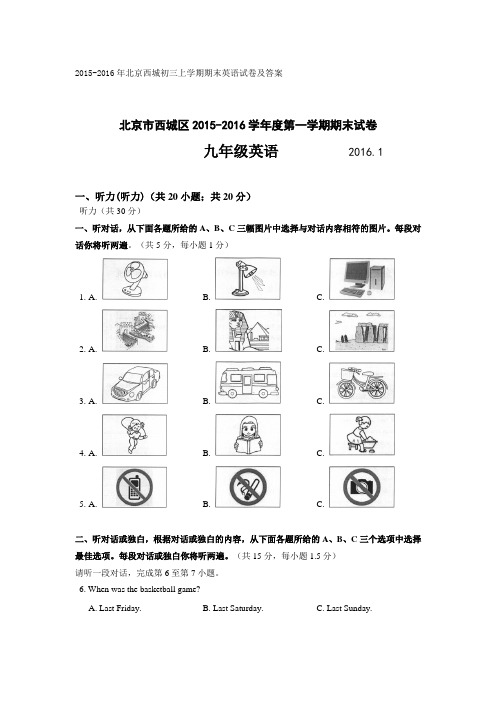
2015-2016年北京西城初三上学期期末英语试卷及答案北京市西城区2015-2016学年度第一学期期末试卷九年级英语 2016.1一、听力(听力)(共20小题;共20分)听力(共30分)一、听对话,从下面各题所给的A、B、C三幅图片中选择与对话内容相符的图片。
每段对话你将听两遍。
(共5分,每小题1分)1. A. B. C.2. A. B. C.3. A. B. C.4. A. B. C.5. A. B. C.二、听对话或独白,根据对话或独白的内容,从下面各题所给的A、B、C三个选项中选择最佳选项。
每段对话或独白你将听两遍。
(共15分,每小题1.5分)请听一段对话,完成第6至第7小题。
6. When was the basketball game?A. Last Friday.B. Last Saturday.C. Last Sunday.7. What was the score?A. 101-88.B. 100-98.C. 101-98.请听一段对话,完成第8至第9小题。
8. Who will cook dinner?A. The girl.B. The boy.C. Their mum.9. What will the girl do on Friday?A. Do some shopping.B. Do some cleaning.C. Do some washing.请听一段对话,完成第10至第11小题。
10. Where did the man spend his holiday?A. In England.B. In Bali.C. In Brazil.11. Why did he mostly stay in small guest houses?A. Because they were close to the beach.B. Because he could take great photos there.C. Because they were cheap and interesting.请听一段对话,完成第12至第13小题。
2015西城区初三一模英语试题及答案(word版)
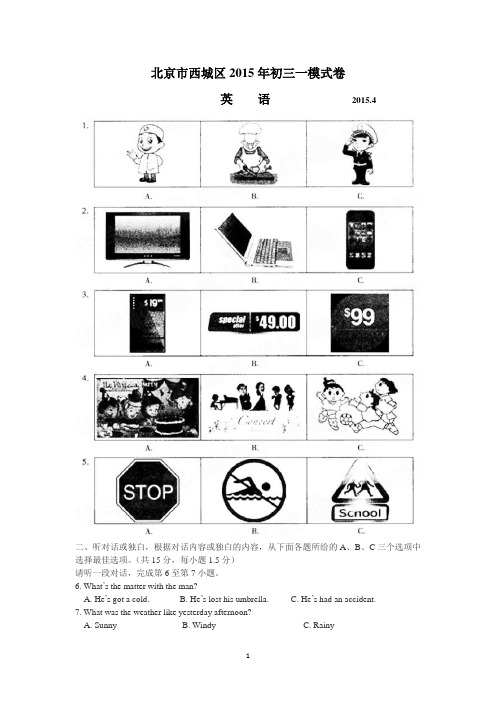
北京市西城区2015年初三一模式卷英语2015.4二、听对话或独白,根据对话内容或独白的内容,从下面各题所给的A、B、C三个选项中选择最佳选项。
(共15分,每小题1.5分)请听一段对话,完成第6至第7小题。
6. What’s the matter with the man?A. He’s got a cold.B. He’s lost his umbrella.C. He’s had an accident.7. What was the weather like yesterday afternoon?A. SunnyB. WindyC. Rainy8. What’s Helen going to do on Friday evening?A. To visit her neigh hours.B. To go out with her friends.C. To have a birthday party.9. What’s the woman going to take with her?A. A bottle of wine.B. Some food and drinks.C. Some flowers.请听一段独白,完成第10 至第11 小题。
10. What can we learn about the man?A. He learnt cooking from his mother.B. He is taking a cooking lesson.C. He works in a restaurant.11. What makes the woman get bored now?A. Cooking at home.B. Eating take-out food.C. Bing busy with her work.请听一段独白,完成第12 至第13 小题12. What is the woman doing now?A. Putting paper cuts on the window.B. Teaching how to make paper cuts.C. Drawing some pictures for paper cuts.13. How did the woman get her paper cut?A. She bought it at a local market.B. She got it from an old lady.C. She made it all by herself.请听一段独白,完成第14 至第15 小题14. Why can’t the speaker go to work today?A. Her son is ill.B. She isn’t feeling well.C. She has to go to her son’s school.15. What does the speaker ask Raman to do?A. To get in touch with the trainer.B. To book a room on the third floor.知识运用(共25 分)四、单项填空(共10 分,每小题1 分)从下面各题所给的A、B、C、D 四个选项中,选择可以填入空白处的最佳选项。
初三年级英语暑期作业答案2015年新版

初三年级英语暑期作业答案2015年新版第一部分:听力(共三节,每小题1.5分,满分30分) 1-5: C A A B B 6-10: C A A B C11-15: A B A C B 16-20:A C.C B B第二部分:英语知识运用(共2节,满分30分) 第一节:单项填空(共15小题;每小题1分,满分15分) 21-25:D、A、C、D、C 26-30:A、B、D、C、D31-35:C、C、B、B、A第二节:完形填空(共15小题;每小题1分, 满分15分) 36-40:B、A、D、D、C 41-45:B、A、C、D、A46-50:B、D、C、B、C第三部分:阅读理解(共25小题;前20每小题2分,后5题第小题1分,满分45分)51-55:C、A、D、B、A 56-60:B、C、A、C、A61-65:B、D、B、C、A 66-70:C、F、A、E、B第四部分:写作(共四节,满分45分)第一节词汇 (共10小题;每小题1分,满分10分)A) (满分5分;每小题1分)71:fifteen-year-old 72:listening 73:worried 74:failed 75:centuriesB) (满分5分;每小题1分)76:enjoy 77:quickly 78:saves 79:back 80:online 第二节:完成句子(共10小题;满分15分)A) (满分5分;每小题1分)81:be held 82:Neither nor 83:where bought 84:Why eat 85:spent onB) (满分10分;每小题2分)86:put weight 87:depend on 88:where to 89:with open 90:Its that第三节:补全对话(共10小题;每小题1分,满分10分)A)根据下面的对话同内容,从对话的选项中选出能填入空白处的最佳选项,并将其选项标号填入文后的答题栏内。
北京市西城区2015年初三一模英语试卷
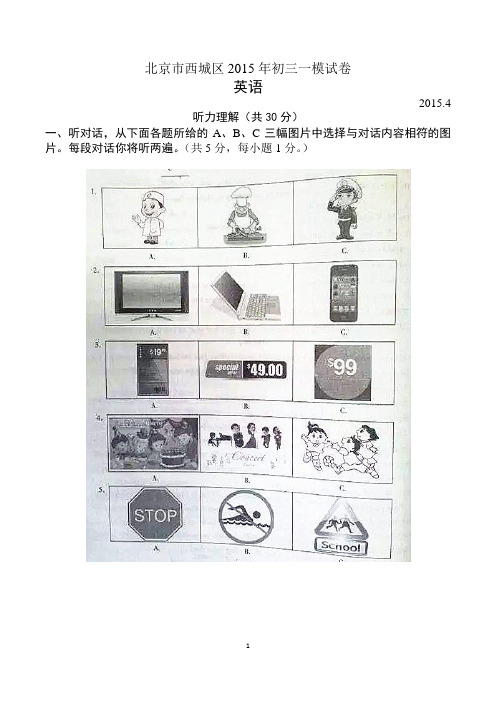
北京市西城区2015年初三一模试卷英语2015.4听力理解(共30分)一、听对话,从下面各题所给的A、B、C三幅图片中选择与对话内容相符的图片。
每段对话你将听两遍。
(共5分,每小题1分。
)二、听对话或独白,根据对话或独白的内容,从下面各题所给的A、B、C三幅图片中选择最佳选项。
每段对话或独白你将听两遍。
(共15分,每小题1.5分。
)请听一段对话,完成第6至第7小题。
6. What’s the matter with the man?A. He’s got a cold.B. He’s lost his umbrella.C. He’s had an accident.7. What was the weather like yesterday afternoon?A. Sunny.B. Windy.C. Rainy.请听一段对话,完成第8至第9小题。
8. What’s Helen going to do on Friday Evening?A. To visit her neighbours.B. To go out with her friends.C. To have a birthday party.9. What’s the woman going to take with her?A. A bottle of wine.B. Some food and drinks.C. Some flowers.请听一段对话,完成第10至第11小题。
10. What can we learn about the man?A. He learnt cooking from his mother.B. He is taking a cooking lesson.C. He works in a restaurant.11. What makes the woman get bored now?A. Cooking at home.B. Eating take-out food.C. Being busy with her work.请听一段对话,完成第12至第13小题。
西城区九年级英语综合练习三

西城区九年级英语 综合练习三一、单项填空中选出一个能填入句中空白处的最佳答案。
从每小题A、B、C、D中选出一个能填入句中空白处的最佳答案。
1.—The pet dog in your hand is very nice. Is it ________?—Yes, but I'll give it to my friend, Lucy as ________ birthday present.A.you; her B.yours; hers C.yours; her D.you; hers 2.—Good morning, madam. Can I help you?—Sure, I'd like ________ for cooking vegetables.A.two cups of tea B.three pieces of breadC.one bowl of dumplings D.five kilos of oil3.—Have you seen the CCTV news on TV?—Yes, ________ children had a good festival on the ________ Children's Day.A.millions of; sixty B.ten million; sixtyC.millions of; sixtieth D.ten millions; sixtieth4.—Would you like to go to the concert with me tonight?—I'd love to, but ________ of us couple has tickets. Do you have some?A.both B.all C.neither D.none 5.—Where was your brother at this time last night?—He was writing an e-mail ________ I was watching TV at home.A.as soon as B.after C.until D.while 6.—Could you please tell me ________ in today's newspaper?—Sorry, ________A.something special; special nothingB.special something; special nothingC.anything special; something specialD.something special; nothing special7.—May we leave the classroom now?—No, you ________. You ________ to leave until the bell rings.A.mustn't; are allowed B.don't have to; are supposedC.needn't; aren't allowed D.can't; aren't supposed8.—I'm sure I will get good grades (成绩) in the graduation exam.—If so, I believe your parents will ________ the result.A.be satisfied with B.be angry aboutC.be bored of D.be worried about9.—Have you seen the TV play My Ugly Mother?—Yes, it's well worth ________. It's so moving that I ________ it twice.A.seeing; see B.to see; saw C.seeing; have seen D.to see; had seen 10.—Can you tell me ________?—By doing more speaking.A.how I will improve my English B.which way can I chooseC.how do I deal with my English D.what's wrong with my English 11.—We'll have a hiking trip, but when shall we meet?—Let's make it ________ half past eight ________ the morning of June 21.A.at; in B./; on C./; in D.about; by12.—I'm very tired these days because of studying for physics.—Why not ________ music. It can make you ________.A.listen to; relaxing B.to listen to; to relaxC.listening to; relax D.listen to; relax13.—Hello, Mike. Long time no see. Where are you?—Oh, not only my parent but also I ________ Wuhan for a month.A.have gone to B.have been to C.has been in D.have been in14.—I hear Yang Yan made an English speech at the graduation ceremony yesterday.— ________, and________.A.So she did; so did I B.So did she; so I didC.So she was; so I was D.So was she; so I was15.—Excuse me, may I take a seat here?— ________. The man on the seat has left.A.You'd better not B.No, thanksC.Yes, please D.I'm afraid not二、完形填空阅读下面短文,掌握其大意,从各题所给的四个选项中,选出一个最佳答案。
2015年西城区初三一模英语试卷及答案
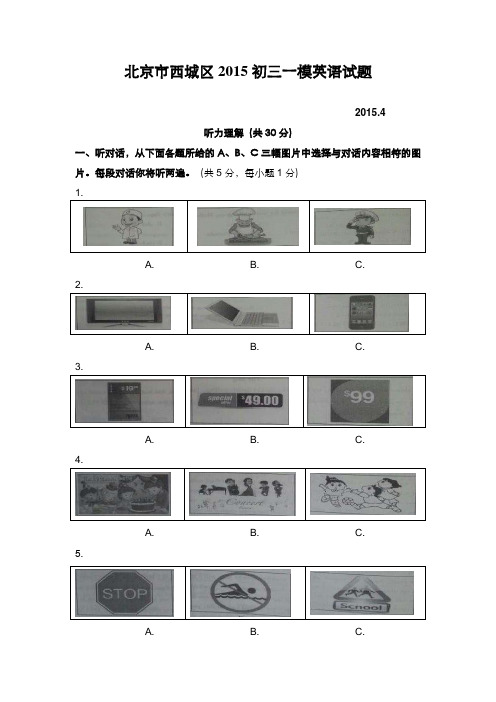
北京市西城区2015初三一模英语试题2015.4听力理解(共30分)一、听对话,从下面各题所给的A、B、C三幅图片中选择与对话内容相符的图片。
每段对话你将听两遍。
(共5分,每小题1分)1.A. B. C.2.A. B. C.3.A. B. C.4.A. B. C.5.A. B. C.二、听对话或独白,根据对话或独白的内容,从下面各题所给的A、B、C三个选项中选择最佳选项。
每段对话或独白你将听两遍。
(共15分,每小题1.5分)请听一段对话,完成第6至第7小题。
6.What’s the matter with the man?A. He’s got a cold.B. He’s lost his umbrella.C. He’s had an accident.7. What was the weather like yesterday afternoon?A. Sunny.B. Windy.C. Rainy.请听一段对话,完成第8至第9小题。
8. What’s Helen going to do on Friday evening?A. To visit her neighbours.B. To go out with her friend.C. To have a birthday party.9. What’s the woman going to take with her?A. A bottle of wine.B. Some food and drinks.C. Some flowers.请听一段独白,完成第10至第11小题。
10. What can we learn about the man?A. He learnt cooking from his mother.B. He is taking a cooking lesson.C. He works in a restaurant.11. What makes the woman get bored now?A. Cooking at home.B. Eating take-out food.C. Being busy with her work.请听一段独白,完成第12至第13小题。
北京市西城区新初三暑假英语综合训练卷 2
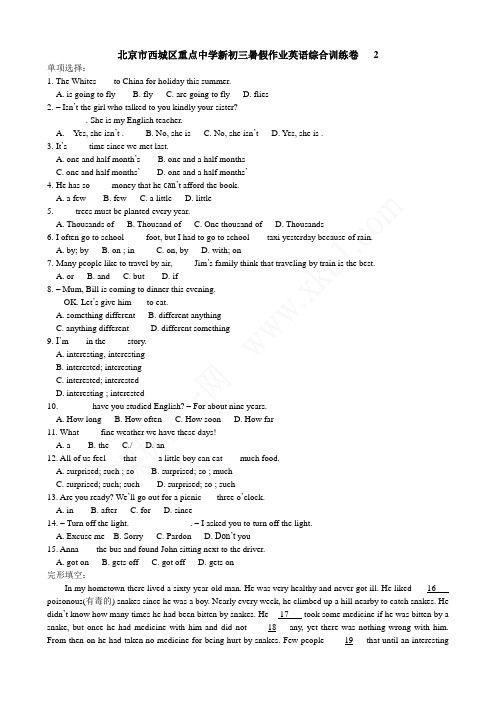
北京市西城区重点中学新初三暑假作业英语综合训练卷 2单项选择:1. The Whites ___ to China for holiday this summer.A. is going to flyB. flyC. are going to flyD. flies2. – Isn’t the girl who talked to you kindly your sister?-- _____. She is my English teacher.A. Yes, she isn’t .B. No, she isC. No, she isn’tD. Yes, she is .3. It’s ____ time since we met last.A. one and half month’sB. one and a half monthsC. one and half months’D. one and a half months’4. He has so ____ money that he can’t afford the book.A. a fewB. fewC. a littleD. little5. ____ trees must be planted every year.A. Thousands ofB. Thousand ofC. One thousand ofD. Thousands6. I often go to school ____ foot, but I had to go to school ___ taxi yesterday because of rain.A. by; byB. on ; inC. on, byD. with; on7. Many people like to travel by air, ____ Jim’s family think that traveling by train is the best.A. orB. andC. butD. if8. – Mum, Bill is coming to dinner this evening.-- OK. Let’s give him___ to eat.A. something differentB. different anythingC. anything differentD. different something9. I’m ___ in the ____ story.A. interesting, interestingB. interested; interestingC. interested; interestedD. interesting ; interested10. -- _____ have you studied English? – For about nine years.A. How longB. How oftenC. How soonD. How far11. What ____ fine weather we have these days!A. aB. theC./D. an12. All of us feel ___ that ____ a little boy can eat ___ much food.A. surprised; such ; soB. surprised; so ; muchC. surprised; such; suchD. surprised; so ; such13. Are you ready? We’ll go out for a picnic___ three o’clock.A. inB. afterC. forD. since14. – Turn off the light. --- ___________. – I asked you to turn off the light.A. Excuse meB. SorryC. PardonD. Don’t you15. Anna ___ the bus and found John sitting next to the driver.A. got onB. gets offC. got offD. gets on完形填空:In my hometown there lived a sixty-year-old man. He was very healthy and never got ill. He liked ___16___ poisonous(有毒的) snakes since he was a boy. Nearly every week, he climbed up a hill nearby to catch snakes. He didn’t know how many times he had been bitten by snakes. He__ 17___ took some medicine if he was bitten by a snake, but once he had medicine with him and did not ____18___any, yet there was nothing wrong with him. From then on he had taken no medicine for being hurt by snakes. Few people ____19___that until an interestingstory took place.One day last spring, when the old man was having a walk in the street, a wild dog ran at him and hurt him on the leg with its mouth. The old man was too __20__. He picked up a big stone and ran after the dog. But __21__the old man caught up with it, the dog __22___down and died after running about one hundred meters long. Being paid no attention to, the old man took the dead dog home and cooked the ___23___for food. A neighbor happened to ___24___him and had a piece of meat, too. But soon after the neighbor ate the meat, he had a stomachache and had trouble in breathing. The neighbor was __25___to the hospital nearby.The doctor was a man with much experience and he knew the old man very well . After asking a few questions and __26__ a general examination, the doctor let the old man’s neighbor take some medicine for snake poison. Happily for them , half an hour later, the patient got well.It was said the snake poison in the strange old man’s __27__was much more poisonous than in a big poisonous snake. So this story had happened.16. A. playing B. selling C. catching D. eating17. A. carefully B. certainly C. usually D. happily18. A. bring B. buy C. eat D. take19.A. knew B. believed C. heard D. understood20.A. painful B. afraid C. angry D. nervous21. A. until B. when C. before D. as22. A. lay B put C. laid D. sat23. A. dog B. meat C. snake D. himself24. A. meet B. visit C. help D. ask25. A. taken B. carried C. made D. asked26. A. giving B. having C. taking D. showing27. A. leg B. stomach C. mouth D. body阅读理解AGeneral speaking, American food is rather bland(清淡的)and spiced. Salads are much liked and are served all the year round. Many American people are trying to keep down their weight and so they are ―calorie(卡)‖ or ― weight watchers‖ meals. In markets one can find ― No Cal‖ drinks (means without calories) such as ginger ale (麦酒)or cola. ―Diet(饮食)‖ foods without sugar or salt are also at hand in food stores.Waiters in American restaurants tend to believe that everyone drinks coffee. If a waiter suddenly asks ―Now or later?‖ What he means is ― Do you want coffee with your meal or later?‖ Many Americans drink coffee or tea with their meals. When dining out in the US, we can ask for tea, milk, coke, beer and so on, if we prefer these to coffee. American restaurants cannot serve beer, wine, or liquor(酒类)unless they are licensed to do so.The main course in American meals is usually meat, chicken, or fish, but seldom is more than one of these served at the same meal ( except that seafood can be used as an appetizer(开胃菜) ). Most Americans eat quickly during the day—that is, breakfast and lunch—unless it is social, business, or family occasion(场合). The evening meal, however, is usually leisurely(悠闲的) and a family time.Racing through daytime meals is a part of the ―American pace‖of life, for working time is considered precious(宝贵的). There is also another reason, that others in public eating places are waiting for you to finish so they can be served and get back to work within the allotted time. Each one hurries to make room for the next person.28.According to the passage, American restaurants___________.A. can’t sell alcoholic(酒精的)drinkB. can serve diet foodsC. usually offer spiced(调料)foodsD. usually refused to serve other drinks except coffee29. The underlined word ―allotted‖ probably means_______.A. askingB. allowedC. givenD. working30. Which of the following is NOT true according to this passage?A. Americans usually eat very fast because they consider time to be precious.B. Americans eat fast in restaurants partly because they have to give room for others.C. Lunchtime for many Americans is rather short.D. Americans can enjoy free coffee but not drinks.31. What is the main idea of the passage?A. American food is popular.B. American food tradition.C. Americans’ way of eating.D. Americans’ life.BWe don’t have rush hours any more,‖ said Charles M. Mclean, who run the nation’s busiest road. ―We have rush periods, and they keep getting longer and longer.‖Mclean was describing Chicago’s 235 miles of expressway(高速公路), but the same might be said about almost any of the expressways that have become an important part of the American city life—and about the heavy traffic that often blocks them. In Chicago ,a computerized system(系统) that controls(控制) traffic on the city’s seven expressways has been developed. Now one man a —controller—can follow the movement of Chicago’s traffic by looking at a set of lights.The system uses electronic sensors( 传感器)that are built into each expressway, half a mile apart. Several times a second, the computer receives information from each sensor and translates it into green, yellow, or red lights on a map in the control room.A green light means traffic is moving 45 miles an hour, yellow means 30 to 45 miles an hour and red means heavy traffic –cars standing still or moving less than 30 miles an hour.―See that red light near Austin Avenue?‖ The controller asked a visitor,‖ That’s a repair truck fixing the road, and the traffic has to go around it.‖At the Roosevelt Road entrance to the expressway, the light kept changing from green to red and back to green again.‖ A lot of trucks get on the expressway there,‖the controller explained.‖They can’t speed up as fast as cars.‖The sensors show immediately where an accident or a stopped car is blocking traffic, and a truck is sent by radio to clear the road.The system has lowered the number of accidents by 18%.There are now 1.4 deaths on Chicago’s expressways for each 100 million miles traveled, while in other parts of the country there are 2.6.Traffic experts say that the Chicago system is the ―coming thing ‖, and systems like Chicago’s are already in use on some expressways in Los Angeles and Houston.‖ Chicago has taken the lead.‖ says New York City’s traffic director.32. What would be the best title for this passage?A. Computerized Traffic Control SystemB. Rush Period Getting LongerC. The Nation’s Busiest RoadD. Sensors on Expressways33. How does the controller follow Chicago traffic?A. By learning how to use a computer.B. By waiting for the red light to turn to green.C. By watching the sensors into the expressways.D. By looking at a set of lights on the map in the control room.34. Which color shows that the traffic moves the fastest?A. RedB. YellowC. GreenD. Black35. Which of the following is NOT true according to the passage?A. There were more accidents on Chicago’s expressways before the system is in use.B. When there is an accident or a stopped car, a truck will be sent to clear the road.C. Houston has used the system before Chicago.D. It is easy for Charles M. Mclean to follow the movement of Chicago’s traffic.Left buttonSetting up the Wireless Mighty MousePut the batteries in the mouse first. Then pair the mouse and the computer. Setting up the mighty mouse is) the software and turn the mouse on for it to get detected by the computer.激光) tracking technology, so you can use it on most surfaces. Another new36. You have to ______ before setting up the mouse.A. turn the scroll ball slightlyB. clean the mouse with a clothC. check the software in the mouseD. connect the mouse and the computer37. What can we learn about the wireless mighty mouse?A. Its scroll wheel can move in all directions.B. Different buttons have different functions.C. Side buttons are more useful than left and right buttons.D. Only the right button can display an item’s short-cut menu.38. The passage is probably taken from a(an) ______.A. textbookB. instructionC. research reportD. scientific essayD.While I was in 9th grade, I built a circuit (电路装置) for the traffic system of our city. After getting the first prize, I got this valuable advice from my father: ―Do whatever interests you, and don’t let the work challenge you, make sure you are challenging that work.‖I have always preferred the projects which are challenging and related to real life problems. I clearly remember building a shipping program several years ago. I divided the whole project into several small sections. When I understood it clearly, I used my brainstorming skill on it, and gave some basic ideas. Then I asked my professor for help before jumping into coding (编码). At first, I did not know how to ask questions correctly and always asked the question ―How do I do it?‖ As I kept working and discussed with my professor, I became more comfortable and those ―how‖ questions soon turned into ―what if I do this and that‖ types of questions.It took me four days to write the code. The desire to solve the problem kept me sleepless all nights brainstorming in even greater details. Every time I saw my program running smoothly, I exploded with joy. I still remember the last day of my work. I was getting some problem and didn’t know what to do. At that moment, a man came in to clean. He had headphones, and he was dancing while cleaning the room. Seeing this, I burst out laughing. That moment calmed me. I regained energy and interest and started to work again, and soon I fixed the problem.My success in the project proved that breaking up a large problem into small parts could help find a possible solution. Discussing the problem with others was also very beneficial. Now I have gained the confidence to attempt any kind of project.39. According to the passage, the writer was interested in ______.A. developing traffic systemsB. doing challenging projectsC. winning great prizesD. writing different codes40. The writer asked the question ―h ow do I do it‖ at first because ______.A. he had no clear idea about his programB. he was too shy to express himselfC. he wanted to be understood easilyD. he preferred this kind of question41. We learn from the passage that the writer’s shipping program ______.A. would benefit people a lotB. was done together with othersC. was difficult and needed patienceD. cost much money and energy42. What would be the best title for the passage?A. Do It YourselfB. No Pains, No GainsC. Learning with InterestD. Practice Makes Perfect阅读还原:When I was about 12, I had an enemy, a girl who liked to point out my shortcomings(缺点). Sometimes she said I was lazy.______43_______. Sometimes she said I talked too much, and so on. I tried to put up with (忍受) her as long as I could. _______44__________ I ran to my father with tears in my eyes.He listened to me quietly, and then he asked,‖Are the things she said true or not? Go and make a list of everything she said and mark the points that are true. Pay no attention to the other things she said.‖I did as he told me. ______45_____. I brought the list back to my dad. He refused to take it. ―That’s just for you,‖ he said. ―When something said about you is true, you’ll find it will be helpful to you. Listen to them all, but hear the truth and do what you think is right.‖Going to a nature center---In State Audubon societies, there are usually smaller nature centers. Naturalists are ready to answer kids’ questions so parents don’t need to worry about teaching the subject matter themselves.Hiking---Going on a hike is a great way to go outdoors and get some exercise. State parks can offer free paths to hike along and many fields to explore.Gardening---Gardening is a wonderful family activity. Not only can the whole family get involved, but everyone can benefit from the harvest. Since it’s winter, you might just start with a family plan for the garden. The garden can be a cooperative effort where parents can teach their children teamwork. Assign tasks to each family member. Who plans? Who waters?Fruit picking---It’s a great seasonal outdoor activity. Children get to see how fruits grow and everyone gets to enjoy the fruits which they pick.Cleaning up---Taking part in nature clean-ups or volunteering to do path maintenance(维护)teaches kids that they have the ability to do something positive for the environment and communities. When parents get involved, they can set a good example for their children to follow, which will help children realize their responsibility to protect the environment.47. Will the outdoor activities drive your family’s sadness away?______________________________________________________48. Who will answer kid s’ questions in nature centers, naturalists or parents?______________________________________________________49. Which places can offer free paths to hike along?______________________________________________________50. What is a great seasonal outdoor activity?______________________________________________________51. What can children learn from these outdoor activities?______________________________________________________书面表达成长中每个人都要面对烦恼,并解决问题。
北京市海淀区重点中学2015年7月新初三暑假备战2016年中考阅读表达题 共5组 含答案
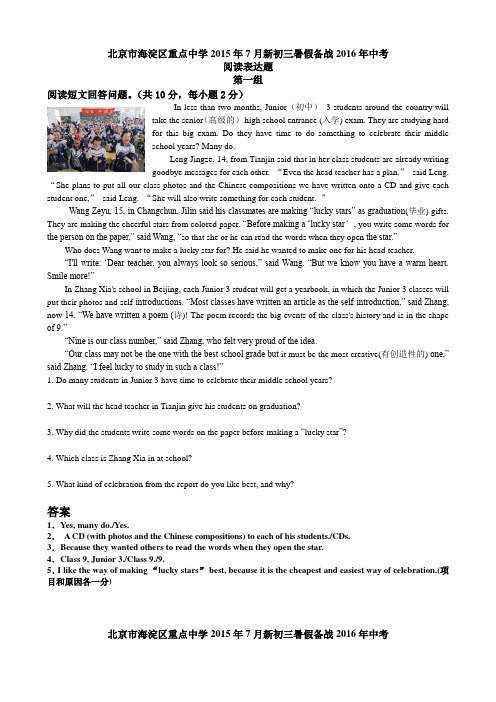
北京市海淀区重点中学2015年7月新初三暑假备战2016年中考阅读表达题第一组阅读短文回答问题。
(共10分,每小题2分)In less than two months, Junior(初中)3 students around the country willtake the senior(高级的)high school entrance (入学) exam. They are studying hardfor this big exam. Do they have time to do something to celebrate their middleschool years? Many do.Leng Jingze, 14, from Tianjin said that in her class students are already writinggoodbye messages for each other. “Even the head teacher has a plan.”said Leng. “She plans to put all our class photos and the Chinese compositions we have written onto a CD and give each student one,”said Leng. “She will also write something for each student. ”Wang Zeyu, 15, in Changchun, Jilin said his classmates are making “lucky stars” as graduation(毕业) gifts. They are making the cheerful stars from colored paper. “Before making a …lucky star’, you write some words for the person on the paper,” said Wang, “so that she or he can read the words when they open the star.”Who does Wang want to make a lucky star for? He said he wanted to make one for his head teacher.“I'll write: …Dear teacher, you always look so serious,” said Wang. “But we know you have a warm heart. Smile more!”In Zhang Xia's school in Beijing, each Junior 3 student will get a yearbook, in which the Junior 3 classes will put their photos and self-introductions. “Most classes have written an article as the self-introduction,” said Zhang, now 14. “We have written a poem (诗)! The poem records the big events of the class's history and is in the shape of 9.”“Nine is our class number,” said Zhang, who felt very proud of the idea.“Our class may not be the one with the best school grade but it must be the most creative(有创造性的) one,” said Zhang. “I feel lucky to study in such a class!”1. Do many students in Junior 3 have time to celebrate their middle school years?2. What will the head teacher in Tianjin give his students on graduation?3. Why did the students write some words on the paper before making a “lucky star”?4. Which class is Zhang Xia in at school?5. What kind of celebration from the report do you like best, and why?答案1.Yes, many do./Yes.2.A CD (with photos and the Chinese compositions) to each of his students./CDs.3.Because they wanted others to read the words when they open the star.4.Class 9, Junior 3./Class 9./9.5.I like the way of making “lucky stars”best, because it is the cheapest and easiest way of celebration.(项目和原因各一分)北京市海淀区重点中学2015年7月新初三暑假备战2016年中考阅读表达题第二组阅读短文回答问题。
- 1、下载文档前请自行甄别文档内容的完整性,平台不提供额外的编辑、内容补充、找答案等附加服务。
- 2、"仅部分预览"的文档,不可在线预览部分如存在完整性等问题,可反馈申请退款(可完整预览的文档不适用该条件!)。
- 3、如文档侵犯您的权益,请联系客服反馈,我们会尽快为您处理(人工客服工作时间:9:00-18:30)。
北京市西城区重点中学2015年7月新初三暑假作业2016届初三英语综合训练卷 3单项选择:1.Boys and girls, I have got ____ to tell you. Please listen to me carefully.A. important somethingB. anything importantC. nothing importantD. something important2.She is sad because her uncle ____ cancer.A. died fromB. fall overC. have an effect onD. look after3.Tom didn’t make an effort to study. ____, he failed the examination.A. HoweverB. ButC. As well asD. As a result4.Mary _____ painting for a while , but soon lost interest.A. took toB. took overC. took outD. took up5.She ____ the dog and broke her front teeth.A. fell downB. fell overC. fell back (回去)D. fell apart (不成功)6.The Adventures of Tom Sawyer was written in _____ 19th century.A. aB. theC. anD. /7. You don’t need to hurry. We still have ____ time.A. a great many ofB. manyC. a large amount ofD. a large number of8. He is hard working, brave and ____ honest.A. at firstB. at lastC. above allD. at all9. I need to ___ more about the night course.A. find outB. thanks toC. look afterD. go on10. – What are you doing ? – I ____ my room.A. tidyB. am tidyingC. to tidyD. am going to tidy11. She ___ the book for two weeks.A. has keptB. keptC. boughtD. has bought12. Lily usually ____ one hour cleaning her bedroom every week.A. spendB. spendsC. is spendingD. are spending13. The clouds are dark. I think it ___ rain.A. are going toB. are goingC. is goingD. is going to14. He ____ to Beijing 5 years ago.A. comeB. is comingC. cameD. will come15. The little boy ___ a football match at this time yesterday.A. was watchingB. was watchC. watchedD. were watched完形填空:阅读下面的短文,掌握其大意,然后从短文后各题所给的四个选项中,选择最佳选项。
I was filled with uncertainties and worries until my grandfather told me to stand tall.It was no 16 I wasn’t looking forward to entering ninth grade. High school is well known for being a place for serious competitions, where everyone seems to be 17 physical changes and love self-esteem (自尊). For me,18 was my greatest problem.I had always felt no confidence and out of places as one of the taller members of my class, standing a head19 the other girls.My grandfather would watch me grow 20 uncomfortable, but he didn’t laugh at my self-consciousness (不自在) or try to comfort me. Instead, he would give me advice.“Stand straight and tall,” he’d say, 21 I unsuccessfully tried to make myself smaller and shorter. And each time, I would carefully 22 his words. Even at age 15, I understood that his advice was about more than just inches.My grandfather joined the army to fight for his country when German soldiers 23 his hometown ofTarnow in Poland. “Stand straight, stand tall,” meant something else back then. After the war, he left for America.24 in a new country, he was frightened about his future. Walking into the crowded and noisy streets of New York, “Stand straight, and stand tall,” he would tell himself.Thanks to the help of a 25 friend, he got a job in a jewelry shop on a busy street. Within months, my grandfather was selling jewelry as if he’d been doing it his whole life.I am so proud to be one of those children who carry on 26 family name. My grandfather’s unusual and special experiences have changed the way I think about my own life. His advice to me has become much more than a challenge to 27 my posture. It tells me to be proud of who I am.16.. A. reason B. wonder C. guess D. question17. A. starting with B. showing up C. going through D. making out18. A. shape B. height C. appearance D. shyness19.. A. of B. among C. over D. above20. A. increasingly B. slowly C. greatly D. surprisingly21. A. before B. when C. after D. since22. A. hear B. understand C. catch D. follow23. A. stayed B. broke C. took D. defeat24. A. Being homesick B. Without money C. Full of hopes D. All alone25. A. caring B. lovely C. cheerful D. pleasant26. A. my B. our C. his D. their27. A. form B. build C. choose D. improve阅读理解。
(A)Last year some groups of students made a survey about “How do you spend your free time?” The following diagrams show some results of it.Diagram (1) : Hours for people of different ages who surf the Internet in a week.Diagram (2): Different days students go to the library. (Library Attendance)Diagram (3): Different programs people like.28. People aged _______ spend the least time surfing the Internet every week.A. 4~15B. 16~34C. 35~65D. over 6529. On _______ most of the students go to the library.A. SundayB. MondayC. WednesdayD. Thursday30. According to the third diagram, about _______ of people like watching Tom and Jerry.A. 16%B. 19%C. 13%D. 37%(B)Reading newspapers has become an important part of our life. Many people begin their day by reading the papers. In this way they learn what is going on in the world. But sometimes, they don’t have time to read the news carefully, so they just take a quick look at the front page, at other times they may be in such a hurry that they have time only to look at the headlines.There are newspapers to meet the needs of every reader. In big cities there are many kinds of papers. In small towns there are fewer newspapers. In some places the paper is published once a week. Today, as a group, English language newspapers enjoy the largest number of readers. With the development of the world, some new newspapers will be published in the years to come.31. When people are busy, they .A. do not read newspapersB. still read newspapers carefullyC. only look at the front page of the paper carefullyD. either take a quick look at the front page of the paper or only look at the headline32. Which of the following is right?A. There’re different kinds of newspapers to meet people’s needs.B. There are more papers in small towns than in big cities.C. In some places papers are published every two weeksD. The most important news is not on the front page.33. “Some new newspapers will be published in the years to come .”means.A. more newspapers will be published next yearB. more new kinds of papers will be read in the coming yearC. a great number of new newspapers will be read in the futureD. some new newspapers will be sent in the future(C)Animals do many different, amazing things to get through the winter. Some of them “migrate.” This means that they travel to other places where the weather is warmer or where they can find food.Many birds migrate in autumn. Because the trip can be dangerous, some travel in large groups. For example, geese fly in noisy, “V”– shaped groups. Other kinds of birds fly alone.Some animals stay active in winter. They must change themselves as weather changes. Many change their doing or their bodies. For example, Snowshoe rabbits grow white fur to help them hide in the snow.Food is hard to find in winter. Some animals, like mice, collect lots of food in autumn and store it to eat later. Some animals eat different kinds of food as the seasons change. The red fox eats fruit and insects in spring, summer and autumn. In winter, it can not find these things, so instead it eats small animals.Some animals “hibernate” for part or all of the winter. This is a special, very deep sleep. The animal’s body temperature drops, and it’s heartbeat and breathing slow down. It uses very little energy. In autumn, these animals get ready for winter by eating much more food than in summer and storing it as body fat. They use this fat to keep them alive while hibernating. Some also store food like nuts to eat later in winter. Bears and some bats hibernate.Cold-blooded animals like fish, frogs and snakes have no way to keep warm during the winter. Snakes find protection in holes, and spend the winter without moving during the whole season.Water makes good protection for many animals. When the weather gets cold, they move to the bottom of lakes and rivers. There, frogs and many fish hide under rocks or fallen leaves. Cold water holds more oxygen than warm water, and frogs can breathe through their skin.Every type of insect has its own life cycle, which is the way it grows and changes. Different insects spend the winter in different forms of their lives. Many insects also spend the winter without moving. Their growth and development stop. The insect’s heartbeat, breathing and temperature drop. Some insects spend the winter as pupae. (This is a time when insects change from one form to another.) Other insects die after laying eggs in autumn. The eggs change into new insects in spring and everything begins all over again.34. Many birds fly in large groups because ______________ .A. they can easily find food this wayB. there is danger everywhereC. they can get warm at nightD. they will not be afraid again35. Rabbits spend the cold winter by ______________ .A. eating a lotB. Storing a lot of foodC. running oftenD. growing thicker fur36. In the water, frogs ______________ .A. do not breatheB. sleep and do not eatC. breathe through their skinD. breathe through their mouths37. Which is the best title for the passage?A. How do animals spend the winter?B. How do living things spend the winter?C. How do living things get food in the winter?D. Where do living things move in the winter?(D)I’ve refused to allow my step son Jim to go to university because it will be too expensive and a waste of time. People think I’m selfish or not kind-hearted. But I don’t feel sorry for that, and I think more parents will be coming around to my way of thinking. Britain’s universities are failing to serve either the country or our children. It’s about time we voted with our feet.I can’t remember when I began to change my mind on education. Like a lot of middle-class parents. We had believed that going to university was what your children did. It’s one of the reasons we offered more than $100,000 in fees for Jim to go to a private school rather than a free public one. Education is more important than nice cars, new kitchens or skiing holidays.Jim is a young boy of whom any parent would be proud. He’s clever and helpful; he’s good at things like hanging pictures and mending doors; he can get on well with other kids. But he’s shown little interest in study.It’s not Jim’s intellect that’s the problem – after he entered the school he was asked to sit an exam – but an in-built reluctance (勉强) to do any more work than necessary to get by. We’ve tried everything to make him work harder. None of it has worked. For his final exams, Jim got a D and two Es. Even allowing for our low expectations, this came as a surprise to his mother and me.“Surely,” I said to one of Jim’s teachers, “the only subject Jim would get on with such poor grades would be the kind of subject that wouldn’t be worth doing anyway.”“Not at all,” the teacher answered, as if speaking to a dinosaur. He read out the names of a lot of universities I’d never heard of, saying they’d all be fit for Jim.It was at this point I realized how far away I was from today’s education. I knew that, since I was at school in the early 1980s –when a student with such poor grades as Jim’s would not have been allowed to go to any university – the population in the UK going on to higher education has gone up from 14% to a surprising 44%.38. The reason the writer won’t let Jim go to university is that ______________ .A. The family is too poor to send Jim thereB. there are few universities in the UKC. Jim won’t be allowed to go to universityD. it’s a waste of time and money to do so39. What’s Jim’s main problem?A. He is so slow that he can’t learn anything.B. He is interested in anything except study.C. He doesn’t want to use his head at school.D. He never likes working hard and being busy.40. What is the teacher’s idea in the passage?A. He thinks the writer should encourage Jim to go to university.B. He is sure most universities will certainly refuse to take Jim.C. He is sure Jim’s father is too old to understand today’s education.D. He thinks education in the UK has changed a lot in the past years.41. From the passage we can infer ________________.A. parents are usually strongly against higher educationB. many young people don’t go to university in the UKC. some people can’t follow the steps of the countryD. education in the UK is becoming worse and worse阅读还原:When I was small, I was kind of shy. Fortunately, I changed a lot by junior high. Shyness gets in the way of success, but it doesn’t have to hold you back. Here are some tips that may help you overcome it._______42______ The excitement of being lost at something that you love can help you forget your nervousness while showing off in public.Next, why not get more chances to speak in public? For me, when I got to high school, I took speech classes. _________43_________.Then, don’t think about what will happen. It’s possible that you might be laughed at when speaking. _________44_______ What really happens is better than what we imagine.Finally, remember past successes. Whether it is making a successful speech, remembering past successes can help inspire you to get future success. ________45_______. If you succeeded in the past, then you can succeed again!It’s actually natural to be a little bit nervous about meeting new people, making cold calls, or giving a speech. That nervousness doesn’t have to keep you from succeeding, though.阅读短文,根据其内容回答问题。
